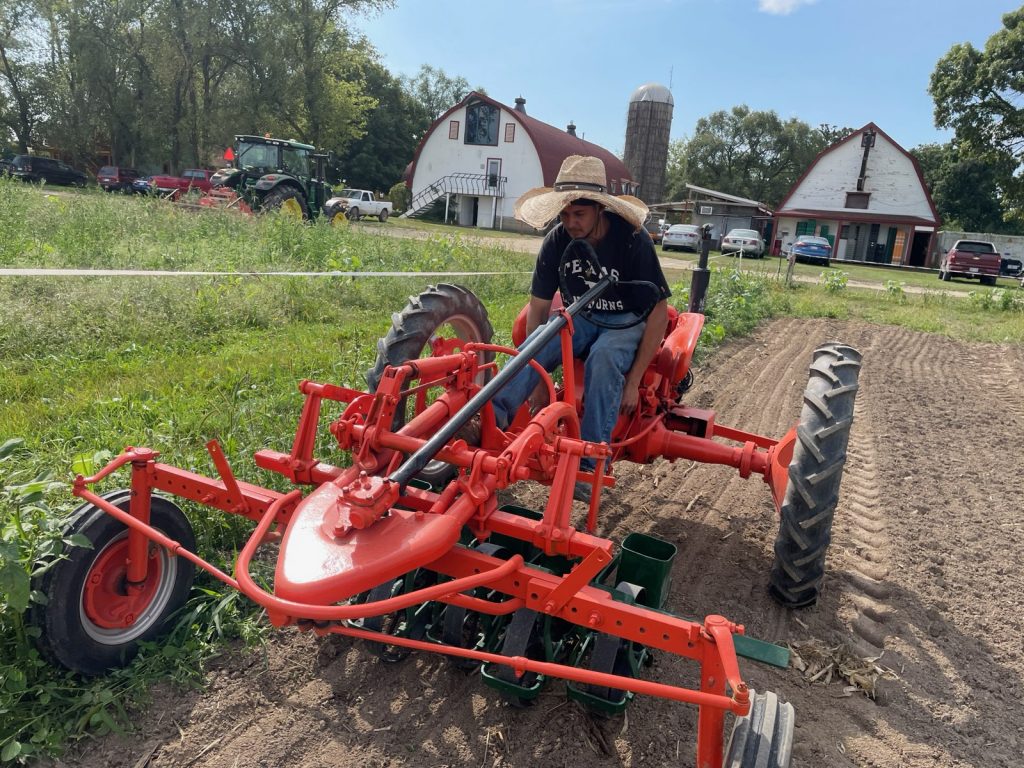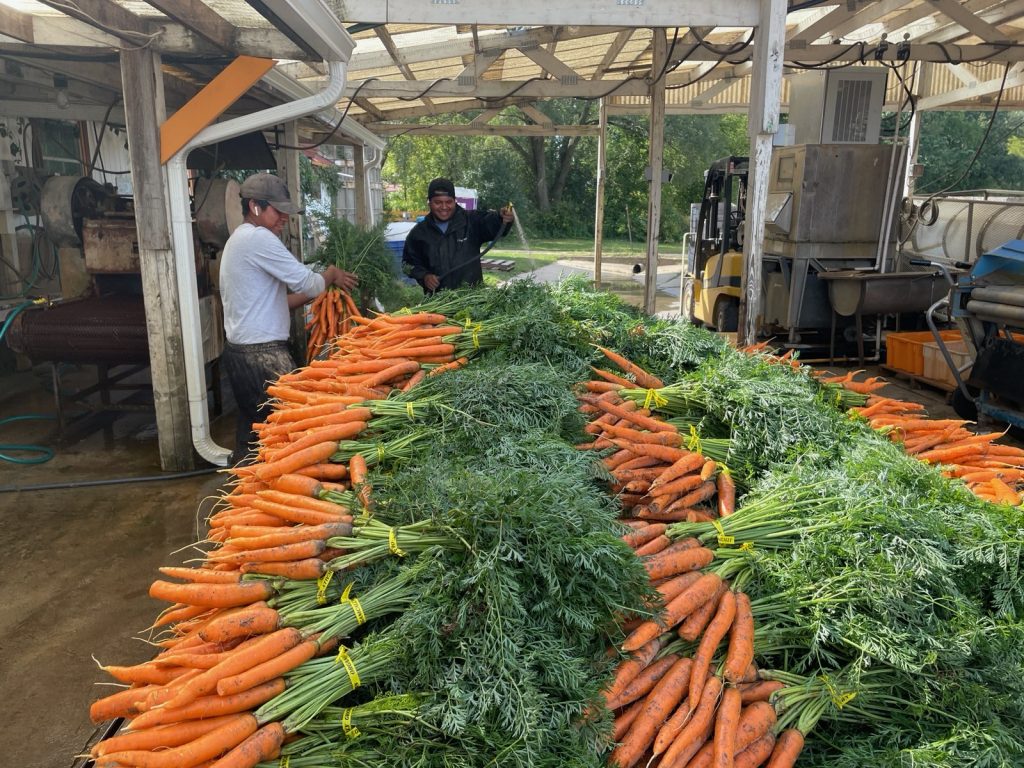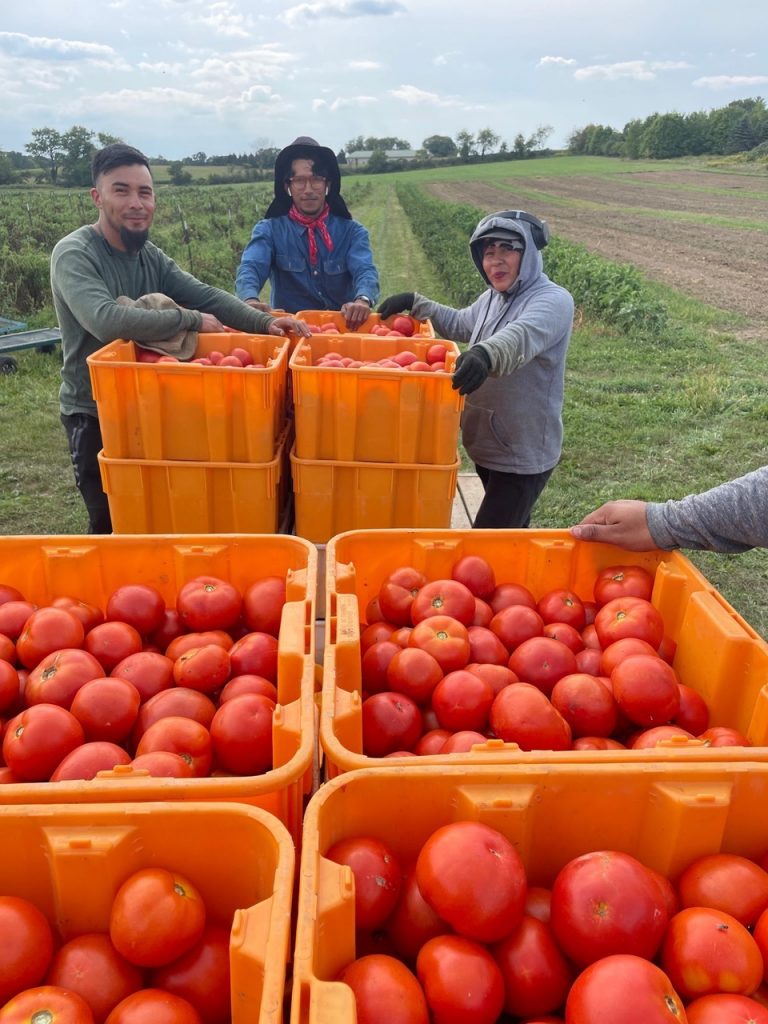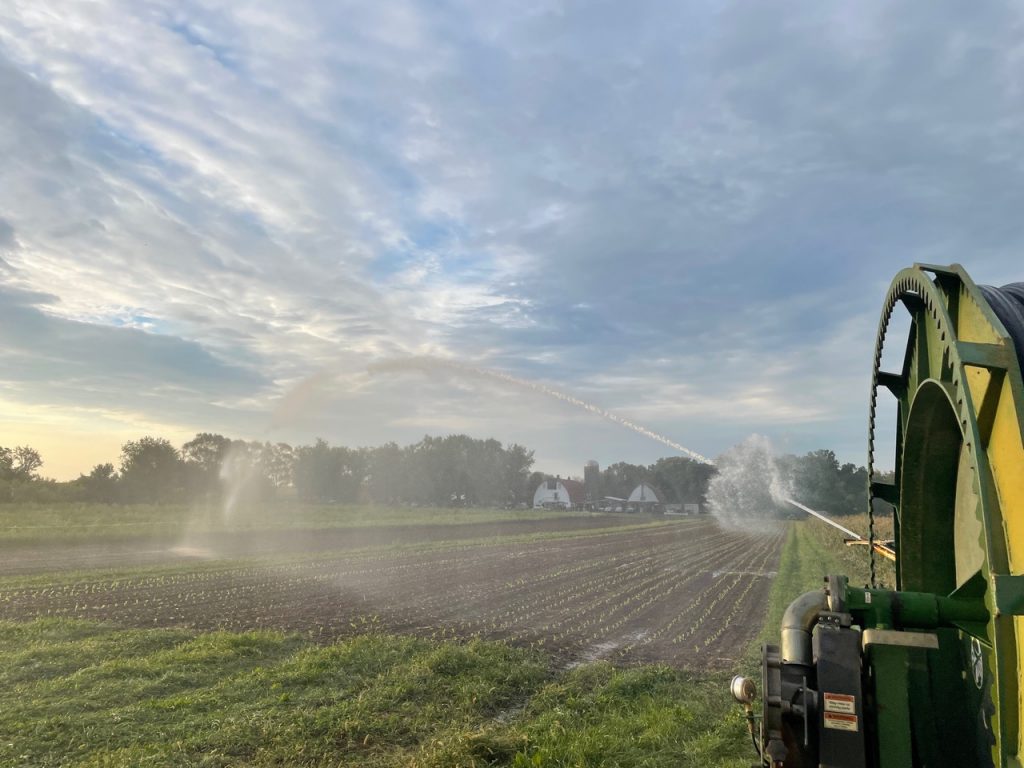Farmer John Writes: A Life in the Day of a Farmer
Harvest Week 11, September 6th – 11th, 2021
I will share with you a day of recent activity on the farm, along with attendant considerations, doubts, sureties, and vacillations.
Early September is about the last chance to get in crops that will mature in the fall. Last Thursday, the second day of September, we transplanted 14,000 seedlings of lettuce, 4,500 seedlings of choy, 1,500 seedlings of Chinese cabbage. That was a lot of transplanting to do in one day—the most we have ever done in a day—and that was a small part of what we did that Thursday. The crew finished at 3:55 pm, 5 minutes before our normal quitting time. At 4 pm, we turned on the irrigator.
Victor seeded 16 500-foot-long beds of baby lettuce, radishes, turnips, arugula, cilantro, dill, and spinach—the most we have ever seeded here in a day. He finished at 3:40 pm. But he wasn’t just seeding that day; he was also supervising the crew on tomato, carrot and arugula harvests.
Pollo spread compost on 5 fields that will be in vegetables next year, and seeded them to a cover crop of fall peas. That wraps up all the field preparations this year for next year’s crops. (Many of the fields are already lush with fertility-building peas.) Oh, yeah, and he lifted a bed of carrots that morning. In the afternoon, he ran the greens harvester to bring in a crop of arugula.
Pollo finished seeding the cover crop of peas at 6 pm, 2 hours after our regular quitting time, but hey, it’s a farm, and Pollo knows what it takes to run a farm; it takes doing what has to be done.
The rest of the crew harvested and washed about 800 bunches of carrots. They harvested a few thousand tomatoes. They separated bulbs of garlic into cloves for our late fall seeding of garlic. They harvested arugula.
This all might read like a pleasant dream, like a well-oiled, highly coordinated farm, with people doing their jobs, and tasks happening on time. But, let’s back up a bit—why did things happen on time? How many trucks, tractors, implements and other equipment had to work reliably in order to get all this work done that day? 4 trucks, 5 tractors, a greens harvester, trailer, wagons, undercutter, compost spreader, Bobcat loader, bunch washer, several coolers, 2 well pumps, grain drill, transplanter, seeder, rotovator, irrigator. These all had to work that day.
Why did these machines work? Because Victor has a shop directive in the winter: make everything able to work all season long, no breakdowns, no downtime—everything has to always work all season long. Victor, Pollo and I know that this is a fantasy goal, but a worthwhile one. Every winter, more and more, Victor gets the equipment into better condition, makes it more reliable.
Do we ever have a mechanical problem during the season? Sure, but fewer than before, and Victor solves problems on the fly with blistering speed—Pollo, too. How can we be so lucky to have people like this on our farm? Such people are almost impossible to find, but here they are, year after year.
Why else did we get all that work done on Thursday? Because we had the foresight to go through a myriad of bureaucratic hurdles in order to host legal guest workers from Mexico on the farm. If we had not arranged for them to work here, we would not have even made it to last Thursday. We would not have had the workers to get the work done this season. The workers aren’t out there locally. They aren’t available. They aren’t interested, aren’t willing.
Why else did we break those seeding and transplanting records on Thursday? Because we had a solid plan the day before. We knew just where we were going to transplant and where we were going to seed. We had the seed on hand. However, by early Thursday morning, that plan was changed into a new plan. Why?
There are two reasons why the crops we plant in early September might never make it to your box. It might be too cold. It might be too dry. We could get the crops into the dry ground on Thursday, but we needed to get them growing right away. Rain was forecast for that night. We had to get them into the ground before the rain that night, but what if it didn’t rain that night? (It didn’t.) If it didn’t rain, the crops would not grow; in fact, the transplants would be wilting the next day.
On Thursday morning, I decided to put all the crops into two fields that we could easily irrigate—on our former sweet corn ground, as opposed to the Wednesday afternoon plan to scatter them in different locations throughout the farm We had to get them in before the rain, but, if it didn’t rain, we had to get them irrigated before it didn’t rain. To heighten the stakes, all the transplanting had to be done that day, because if it did rain that night, the delay of transplanting for a few days due to mud would increase the likelihood that these crops would never see the inside of your box, due to upcoming cold fall weather. (A lot to juggle, eh?)
This farm cannot run on a hope that it will rain, or a hope that it won’t rain. It’s as though we exist in multiple realities—that things will work out and that things won’t work out. There is so often a need for more rain to support the crops; or no rain so the crops can be planted; or less rain so the ground does not become saturated or flooded. There is need for more heat, to mature the crops; less heat, to spare the workers. It’s an interesting space to inhabit, this space of various, often conflicting simultaneous needs and wants.
Farming is an ongoing training in being effective while in a vast range of realities, possibilities, hopes, and desires. It thwarts the whole idea of rights and entitlements, because nothing is fair about the weather, and nothing is unfair about the weather. Both pessimism and optimism are punished and rewarded on a farm. Anticipating a letup in rains might be punished with flooding, and it might be rewarded with sunshine. The weather does what it does. It interrupts. It facilitates. It batters. It rains down ruin and it rains down plenty. Does one deserve something different than what the weather hands them?
To conclude, last Thursday, we did the work we did because we were prepared and flexible (we had a plan and we changed it); we had the equipment and the equipment worked; we had dry soil; and we had a willing and enthusiastic crew. And think of all that work going on concurrently, with different constellations of workers and equipment forming and re-forming throughout the day.
You might read this thinking humanity would be better off to be fed by 3-D printers or robots and hazmatted technicians in antiseptic vertical farms. You might think that the skills and equipment needed to keep this farm going are archaic, that the labor here is being exploited, and the soil vandalized.
Or perhaps the account of this day is poetic to you, husky and rugged, with dust and shouts swirling through the air, trucks and tractors purring and roaring, wagons creaking with carrots and tomatoes, arugula whizzing into crates, seed streaming into rich soil, transplants gliding into the fertile earth.
This is how your box comes about week after week. We feel fortunate for the opportunity.
Shareholders–Come to our Fall Field Day on Saturday, September 18th
We’ll have a potluck lunch, hay rides, free pumpkins and gourds, and maybe bluegrass music (stay tuned about the music—we’ll let you know when we know.) Learn more on our Field Day web page.
Overheard
“There is a cute mouse living in the house. It probably shouldn’t be here. We need one of those humane traps. I wonder what kind of cheese she likes. Gruyere, perhaps. I am making quiche soon—maybe she would enjoy a miniature quiche. She should have a nice doorway for entering her temporary cage, a portal—arched.”
Warmly,
Farmer John











Every time I read one of these posts it makes me think of Virgil’s “Georgics”. The more things change….
http://classics.mit.edu/Virgil/georgics.1.i.html
I had to familiarize myself a bit with Virgil’s “Georgics.” When reading it, I kept thinking, “I love this guy. I want to hang out with him. We need him today.” He could be doing a Podcast. Alas, it would have to be from Spiritland.
You paint a very accurate picture of what it takes to keep vital farm implements working. Only a person who has had to maintain a decent sized garden tractor with multiple systems like PTOs, hydraulics, engine, transmission, power-train, electronics, control cables, and dozens of lubrication points can truly understand the complexity and challenge of farm maintenance. But here is a fact to to consider – there are I believe 14 1/2″ thick manuals on my modest 80 HP tractor’s systems alone. It humbles me to keep it running. My hat is off to you and your crew
Jeff, You really get it. Thank you. I thought about drilling into one tiny detail of keeping a tractor (656 International Utility Hydrostatic Drive) with an erratic carburetor solenoid going in that newsletter, but I realized it could take up the whole newsletter. I might address this detail in a future issue, from the macro to the micro.
We appreciate the efforts of you and your workers! Thank you for once again painting a rich picture of farm life. We enjoy knowing about (at least some) of the processes and enjoy the vegetables and fruits of your labor.
Thank you. I felt when I was writing that newsletter that I had left out at least 90% of the details and considerations.
Wonderful! Thank you for taking the time to illuminate us! My MFA thesis at Northern Illinois University in DeKalb was about disappearing surrounding small farms….my grandparents grew corn, soybeans, sheep and hogs- my grandmother’s garden abundant with lots of Fall canning! I wish I had my own farm, but alas, I will reap the abundant harvests from yours for now!! ❤️
Nicole, Disappearing small farms, such a somber topic. A neighbor was over here the other day. I grew up with him. We talked about driving cattle down the roads to pasture when we were kids. The fields along the roads were fenced. Neighbors came out to their yards to keep the cattle going straight. Traffic slowed and stopped. We talked about how that would probably get the farmer arrested today.
Thank you for this – glimpses behind what goes into the wonderful produce we receive, endear the farm, all of you farmers and workers, and the whole CSA relationship to us even more!
Makes me picture that the work is backstage and the performance is in the box.
Thanks for informing us non-farmers about the farm’s personnel. Appreciate you and your staff’s integrity intelligence and commitment–actions that testify there are still good inhabitants of this earth. As long as the CSA endures, we shall continue to support.
Beautiful note of support–thank you so much.
Wonderful! Amazing! The work and being able to capture it in words! I think be prepared and flexible and operate as if all will work out and as if all won’t work out as planned are great mottos for life!
Great re-cap from you, Cindy. Thank you for writing, and it was great to spend a little time with you recently.